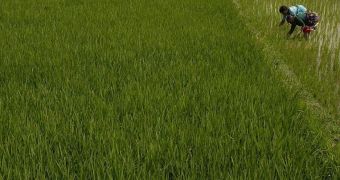In a report prepared for the first-ever meeting of the Global Conference on Agricultural Research for Development (GCARD), researchers paint a bleak picture of the future. They say that, unless immediate action is taken on increasing the world's food supply, we could soon be faced with a crisis unlike any other we ever witnessed. The largest amount of work needs to be placed in poorer nations, which have been kept subservient for centuries, but which now need to become able to feed themselves. Most of these areas do not contribute to the global food supply in a noteworthy proportion.
Therefore, the only solution to this is to develop an efficient form of agriculture in these countries as well. Not only the faith of their respective people depends on that, but also the faith of the world. Currently, as our planet's population is increasing dramatically in size, agricultural reserves are stretched at a limit, as evidenced by the food crisis of the past couple of years. Rich nations such as the United States, and organizations such as the European Union, can still fend for themselves, by turning to advanced technologies, satellite surveillance and datasets and so on.
But poorer nations do not even have access to irrigation systems. Given that most of these regions are found in Africa, and that the continent is battered with scorching temperatures, deserts, and very little precipitations, the scale of the challenge begins to reveal itself. Adding to that is the estimate of the United Nations, which shows that the planet will most likely house 9 billion people by 2050, which means that even more strain will be placed on food reserves. There is also another issue. As more people are born, and eventually need a place to stay, the amount of terrain available for agricultural exploitations will diminish even further, when it's needed the most.
“It's a huge problem. We have more than a billion people hungry at the moment, then on top of that we're going to have to feed a growing human population – we're looking at having to double food production by 2050,” says Imperial College London (ICL) Center for Environmental Policy expert Sir Gordon Conway, who will be the key speaker at the Conference. “In Asia, the Green Revolution created a sense of complacency, that we had solved the problem – and that lasted until the [food price] crisis of 2007,” explains former senior World Bank official and the coordinator of the new report, Uma Lele, quoted by the BBC News.

 14 DAY TRIAL //
14 DAY TRIAL //